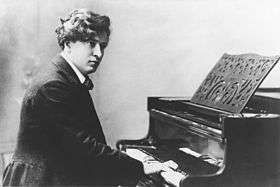Ferruccio Busoni discography (as pianist)
This article lists acoustic recordings made for Columbia by Ferruccio Busoni. The published recordings were issued on 78-rpm records. It is believed that the original matrices were destroyed in a fire at the Columbia factory in England in the 1920s.[1] Copies of the original 78s still exist, and the recordings have been transferred to LP and CD. Some of the digital copies have been computer enhanced.
| Lists of |
| music by Ferruccio Busoni |
|---|
 |
| Scores |
| Performances |
List of acoustic recordings
Table 1. Recordings from 18–19 November 1919 at Columbia Studios, London.[2]
The recordings from these earlier sessions were deemed unsatisfactory,[3] were not issued, and are probably lost.
| Composer | Work | Matrix/Take |
|---|---|---|
| Bach | Prelude and Fugue No.1 in C Major, BWV 846 (Well-Tempered Clavier, Book I) | 76699-1, -2 |
| Mozart | Andantino from Piano Concerto No.9 in E-flat major, KV 271 (BV B 84, excerpt) | 76700-1, -2 |
| Gounod-Liszt | Waltz from the opera Faust, S.407 | 76701-1, -2 |
| Bach | Organ Chorale Prelude "Rejoice, Beloved Christians" BWV 734 (BV B 27) | 76702-1, -2 |
| Beethoven | Ecossaises (not identified further; probably BV B 47) | 76702-1, -2 |
| Chopin | Nocturne in F-sharp major, Op.15, No.2 | 76703-1, -2 |
| Liszt | Hungarian Rhapsody No.13 in A minor S.244, Part 1 (abbreviated) | 76704-1, -2 |
| Liszt | Hungarian Rhapsody No.13 in A minor S.244, Part 2 (abbreviated) | 76705-1, -2 |
| Liszt | Années de Pèlerinage; Deuxième Année - Italie, S.161 No.6: Sonetto 123 del Petrarca | 76706-1, -2 |
| Liszt | Valse oubliée [No.1?, S.215] | 76707-1, -2 |
| Liszt | Etudes d'Exécution Transcendente d'après Paganini, S.140 No.5, "La Chasse" | 76708-1, -2 |
| Chopin | Etude in E minor, Op.25 No.5 | 76709-1, -2 |
| Weber | Piano Sonata No.1 in C major, Op.24: Finale, Presto (Rondo, Perpetuum mobile) | 76710-1, -2, -3 |
Table 2. Recordings from 27 February 1922 at Columbia Studios, London.[4]
| Composer | Work | Issue[5] | Matrix/Take |
|---|---|---|---|
| Bach | Prelude and Fugue No.1 in C Major, BWV 846 (Well-Tempered Clavier, Book I) | L 1445 |
76699-3 76699-4 |
| Bach | Organ Chorale Prelude "Rejoice, Beloved Christians" BWV 734 (BV B 27) | L 1470 | 76702-3 |
| Beethoven | Ecossaises, WoO 83 (BV B 47) | L 1470 | 76702-3 |
| Chopin | Nocturne in F-sharp major, Op.15, No.2 | L 1432 |
76703-3 76703-4 |
| Liszt | Hungarian Rhapsody No.13 in A minor S.244, Part 1 (abbreviated) | L 1456 |
76704-3 76704-4 |
| Liszt | Hungarian Rhapsody No.13 in A minor S.244, Part 2 (abbreviated) | L 1456 |
76705-3 76705-4 |
| Liszt | Années de Pèlerinage; Deuxième Année - Italie, S.161 No.6: Sonetto 123 del Petrarca | 76706-3[6] 76706-4[6] | |
| Chopin | Etude in E minor, Op.25 No.5 | L 1445 |
76709-3 76709-4 |
| Weber | Piano Sonata No.1 in C major, Op.24: Finale, Presto (Rondo, Perpetuum mobile) | 76709-4[7] 76709-5 | |
| Beethoven | Ecossaises (not identified further; probably BV B 47) | 75058-1[8] | |
| Bach | Prelude to Chorale (not identified further; probably BV B 27) | 75058-1[8] | |
| Chopin | Etude in G-flat major, Op.10 No.5 | L 1432 |
75059-1 75059-2 |
| Chopin | Prelude in A major, Op.28 No.7; Etude in G-flat major, Op.10 No.5[9] | L 1470 |
75060-1 75060-2 |
Selected CD reissue
- Busoni and his Legacy: Piano recordings by Busoni • Ley • Petri
- Arbiter 134 (CD; 72 min; ADD using "sonic depth technology"; issued 2002).
- • Ferruccio Busoni (1866-1924): the complete 1922 recordings (L 1445, L 1470, L 1432, L 1456)
- • Rosamond Ley (1882-1969):
- • Liszt: Jeux d'eau a la Villa d'Este (rec. 1942)
- • Liszt: Sonata après une lecture du Dante (rec. 1942)
- • Egon Petri (1881-1962):
- • Liszt: Totentanz (incomplete; first 78 missing; rec. 1936)
- • Busoni: Piano Concerto, Movement 4 (recorded from a live broadcast 2 June 1932 with Hans Rosbaud, conductor)
Notes
- Sitsky, p. 332.
- The information in Table 1 is taken from Roberge, pp. 127-139, and Dyment.
- See Busoni's Letters to His Wife: 1, 19 February 1922 Archived 20 November 2008 at the Wayback Machine (reproduced at The Reproducing Piano Roll Foundation Archived 2007-07-15 at the Wayback Machine web site). Accessed 7 July 2009.
- The information in Table 2 is taken from Sitsky, pp. 331-333; Roberge, pp. 127-139; and Dyment.
- Each issue is a double-sided 78 rpm record.
- This take was rejected because of "rough surfaces"; probably lost.
- Take 4 was deemed acceptable but for some reason was not published; probably lost..
- This take was rejected because of "extraneous noises"; probably lost.
- There is an "improvised bridge passage" between the Prelude and the Etude (Sitsky, p. 332).
gollark: I think I would prefer that over PHP. Perl was... slightly more designed?
gollark: Python is flexible so implement the Macron ones in Python.
gollark: Macron has types. Python... could have types.
gollark: You can use it to help implement Macron. Great idea.
gollark: Dale is inevitable. Dale exists in all spacetime. Dale cannot be escaped under any circumstances.
References
- Dyment, Christopher (1978). "Ferruccio Busoni: His Phonograph Recordings," ARSC Journal, 10:2/3, pp. 185-187. Accessed 7 July 2009.
- Roberge, Marc-André (1991). Ferruccio Busoni: a bio-bibliography. New York: Greenwood Press. ISBN 0-313-25587-3
- Sitsky, Larry (2008). Busoni and the Piano. The Works, the Writings, and the Recordings. (2nd ed.) Hillsdale, NY: Pendragon Press. ISBN 978-1-57647-158-6 [First edition, Westport: Greenwood Press,1986. ISBN 0-313-23671-2]
This article is issued from Wikipedia. The text is licensed under Creative Commons - Attribution - Sharealike. Additional terms may apply for the media files.